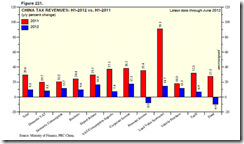The intensifying urge for government’s opium has been palpable everywhere.
A slowing economy in China has prompted for more babbles of government spending stimulus.
Reports the Reuters
The government of Changsha, the capital of central China's Hunan province, has launched an 829 billion yuan ($130 billion) investment stimulus program to bolster the local economy, state media has reported.
The money would be spent on 195 projects, including airport, subway and urban infrastructure facilities, as well as developing energy efficient industries, said a report by the official China News Service on Wednesday.
The government of Changsha, a city known for its machine-making and non-ferrous metal industries, would also speed up financial reform and innovations, said the report, which provided no details about how the program would be financed.
The China News Service paraphrased Chen Runer, the Communist Party secretary of Changsha, saying that economic pressure on the city could not be ignored, despite relatively stable growth in the face of global headwinds, and it was time for initiative.
There was no reference to the program's existence on the government of Changsha's website on Thursday.
Zhang Zhiwei, chief China economist at Nomura in Hong Kong, calculates that the headline number on the stimulus plan is worth 147 percent of Changsha's nominal GDP in 2011, or 1.8 percent of China's national economic output.
Even if spread over five years, Zhang says the implied investment would be equivalent to 46 percent of total annual fixed asset investment in Changsha.
FINANCING QUESTIONS
Skeptics say a program on that scale is implausible and could not be properly financed with China's banks still nursing bad loans worth an estimated 2-3 trillion yuan after local governments racked up debts of 10.7 trillion yuan in the wake of Beijing's nationwide stimulus program unveiled in 2008.
The mixed signals or tentativeness being shown by Chinese authorities reveal of the ongoing political discord.
Yet the Shanghai index continues with its slomo descent, which seems to have been discounting all the inveigles of inflationism
Also China’s tax revenues has been posting a marked decline
Writes Dr. Ed Yardeni (chart also from Dr. Yardeni)
The data confirm a significant slowdown in Chinese economic growth during the first half of this year:
(1) Tax revenues rose only 9.8% y/y during H1-2012, down from 29.6% over the same period a year ago. Growth rates were down across all 11 major revenue sources.
(2) Personal income taxes actually declined 8.0%. A year ago, they rose 35.4%. Corporate income taxes rose 17.3%, but that was down from 38.3% a year ago.
(3) Revenues from property transactions took a hit. The ones from “Land Value Increment” rose 14.7% vs. 91.1% a year ago. “Deed” revenues fell 9.9% after rising 27.5% a year ago.
Dr. Marc Faber lays out the contagion risks from China’s economic slowdown (start at 5:20)


No comments:
Post a Comment